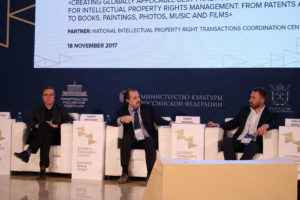Musicon Ambassador Joel “DJ Deadly Buda” Bevacqua addressed the Intellectual Property and Blockchain discussion panel: “Creating Globally Applicable Best Practices in Blockchain Technology in Russia for IP Management: from Patents and Inventions to Books, Paintings, Photos, Music and Films” held at the VI St. Petersburg International Cultural Forum. Below is the video of the address, the text of the speech, displayed slides, and the hand-out text mentioned in the address.
Here is the text from the speech:
“Hello, my name is Joel Bevacqua. Some know me as DJ Deadly Buda. I am the Musician Ambassador for Musicoin. We are honored to be invited to the Cultural Forum and especially by IPChain, which we believe could not only benefit Russia, but might shine as an example worldwide about the possibilities of blockchain and its utilization to aid human creativity.
We sincerely hope that one day, younger people in the audience will look back to this panel as a day that the world took a step in a good direction.
So, what is Musicoin?
Musicoin is a digital currency for the listening and compensation of music. On February 11, 2017, artists could upload their songs to Musicoin.org . When listeners played a song, they paid the artist 1 Musicoin. This payment happened in seconds. 1 Musicoin was worth at the time between 1 and 4 cents in US dollars. The artist could save that Musicoin in hopes it would rise in value, or sell it on and exchange for the currency of his or her choice. This was all achieved with the Musicoin blockchain.

This was a success, but we noticed a problem. As Musicoins rose in value, people played less music. So, we made a change to the Musicoin blockchain which we code-named “U.B.I.” for “Universal Basic Income.”
In this change, the artist still receives 100% of the income, but now 1 play is equivalent to an amount of Musicoin equal to about 2 cents in US dollars.

Also, listening for the public is now free. It is paid for by Musicoin miners. Miners are people with computers that process Musicoin transactions and mint the coins. A part of their mining reward creates the fund for free listening. The miners hope this leads to greater adoption and the Musicoins they retain becoming more valuable.
Through UBI, free listening become the human intelligence of the system and makes many traditional concerns about music piracy irrelevant.
Some might call what we’ve done, “disruptive”, but we feel it is constructive and ultimately an aid to the human imagination. In that spirit, a forthcoming update will allow consent-based location data to be entered in the Musicoin blockchain. This way, an artist might indicate where their payments may go.

If their song is played in Russia, RAO may process some funds, if played in Canada, SOCAN could process certain payments. Theoretically, public domain works could pay its citizen in near real-time.
The possibilities are many and are being realized now. Mobile and software players are expected soon, and even dedicated hardware players are expected within the next year.
I am having a fact sheet about Musicoin passed out. Please contact me after the panel if you are interested in interfacing with the Musicoin blockchain and I will help facilitate it.”
Below is the text from the hand-out mentioned in the speech.
Important Facts:
February 11, 2017, Musicoin becomes the first blockchain-enabled streaming music system in which artists can upload music, the global public can listen, and when they do, the artists are paid in seconds.
You can listen to streaming music at http://musicoin.org . The rights-holder is rewarded with Musicoin.
Musicoin has over 19,000 registered users. 1,500+ are musicians who have uploaded over 7000 tracks.
The price of a Musicoin has gone as high as 4.6 cents USD each. Musicoin’s exchange symbol is: MUSIC.
How it Works:
Every time a song is played the copyright holder is paid an amount of Musicoin equivalent to about $0.02 USD. This amount can fluctuate based on market demand and can be raised or lowered to compete with other online streaming services. The copyright holder receives Musicoin seconds after a listener presses “play” anywhere in the Musicoin system. Once the copyright holder receives the Musicoin, he, she, or it can elect to split the payment with others if needed.
Musicoins are created by people all over the world with personal computers. The process is called “mining.” The computers validate and process Musicoin transactions and are rewarded with Musicoins. 15% of Musicoins mined are allocated to fund the playing of music by the public. Musicians, miners and the public can sell their Musicoin on exchanges for the currency of their choice or use them to transact with one another.
Future Plans:
Easy purchase of Musicoins for the public (a cryptocurrency exchange will no longer be necessary).
Consent-based location data will be available from the Musicoin blockchain.
Mobile apps will be available soon. Embedded hardware platform expected late 2018.
FAQ
What kind of blockchain is Musicoin? Musicoin is its own blockchain, based on Ethereum code. By using its own blockchain, Musicoin can better scale with the increasing demands of music consumption.
How would my blockchain system communicate with Musicoin? Like Ethereum, ERC-20 tokens can be utilized to easily communicate with other blockchains.






